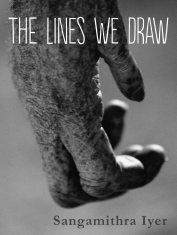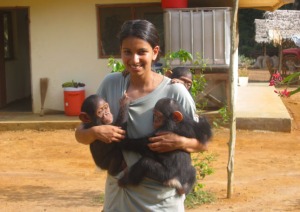“I do a lot of writing on the subway,” Sangamithra Iyer (Sangu) told me during a recent phone conversation about her new bo ok, The Lines We Draw (Hen Press). “It kind of feels like I have my own private writing space.” It’s hard for me to believe anyone could get that feeling on such a busy public transit system, but then, unlike Sangu, I wasn’t blessed with sublime powers of concentration. I’ve also never had a friendly conversation with a vivisector, which Sangu did in 2008. Her discussion with Dr. Alfred Prince, a scientist in the field of hepatitis research, grew from Sangu’s desire to know how people draw the line between what they will and will not do.
ok, The Lines We Draw (Hen Press). “It kind of feels like I have my own private writing space.” It’s hard for me to believe anyone could get that feeling on such a busy public transit system, but then, unlike Sangu, I wasn’t blessed with sublime powers of concentration. I’ve also never had a friendly conversation with a vivisector, which Sangu did in 2008. Her discussion with Dr. Alfred Prince, a scientist in the field of hepatitis research, grew from Sangu’s desire to know how people draw the line between what they will and will not do.
Sangu’s resulting narrative offers a heady dialogue—the animal activist and the animal exploiter—but Sangu handles it with aplomb, and her writing is sometimes more poetry than prose. The Lines We Draw delves into related topics as well, including the environment, political conflict, and the fate of chimpanzees used in labs, where the practice of using them as test subjects is slowly being reduced. Sangu’s affinity for nonhuman primates was evident when she was assistant editor at the now-defunct and much-missed Satya Magazine, where she wrote with great affection about visiting chimp sanctuaries (here, for example).
“Ater Satya, I started an MFA in nonfiction at Hunter College, and I worked on The Lines We Draw a bit during one of my workshops and on the train.” Sangu says she revisited the piece on and off over the years, but recognized it didn’t fit neatly into an obvious publishing niche. “It’s longer than a magazine article and shorter than a book. A lot of literary journals thought it was interesting, but they didn’t feel the subject matter was a good fit for them.”
Perhaps that’s because The Lines We Draw deals not only with animal research, but with Dr. Prince’s—how shall I put this?—unusual fondness for one of his test subjects. Fortunately, the piece landed in the hands of Jasmin Singer and Mariann Sullivan, founders of Our Hen House. “It was really nice working with Jasmin and Mariann,” Sangu says. “This is the first book of their publishing arm.”
I ask Sangu if she has any idea why Dr. Prince was so candid with her. “It was at a time when he was collecting his own memoirs,” she explains. “I felt he wanted to be open about his life and his career. I think he also wanted to lay out his case for wanting to raise money and continue to do research—to tell his side of the story.” But Prince’s story went well beyond justifying his need for funds, I say. “Yes, that was a bit of a shock,” Sangu says with a laugh. “I was unprepared for the direction the conversation was going. In his memoir, when he talks about this, he notes that his own colleagues were outraged by what he was suggesting—to see what would happen if humans and chimpanzees mated—but for him it was just a scientific query. He thought if they mated and the offspring were not sterile, it would prove that we are the same species, which would have ethical implications. The logic behind it is very twisted. He said that to be resistant to it is a form of racism, and that was quite shocking.”
At turns funny and horrifying, The Lines We Draw is a beautifully written ebook, and I was happy to learn we haven’t heard the last from this talented  author. “I am juggling a few other essays of this length, and I’m also working on a book project,” she says.
author. “I am juggling a few other essays of this length, and I’m also working on a book project,” she says.
The Lines We Draw is available on Amazon, Barnes & Noble, and iTunes. Watch Sangu’s moving TEDx talk about her time with nonhuman primates here. And you’ll find more of her writing on her blog, Literary Animal.
Follow @markhawthorne


1 comment
Comments feed for this article
April 2, 2014 at 3:35 am
The Lines We Draw | Literary Animal
[…] Author of Bleating Hearts: The Hidden World of Animal Suffering & Striking At the Roots discusses the ebook with me here. We had a lovely chat about writing about […]